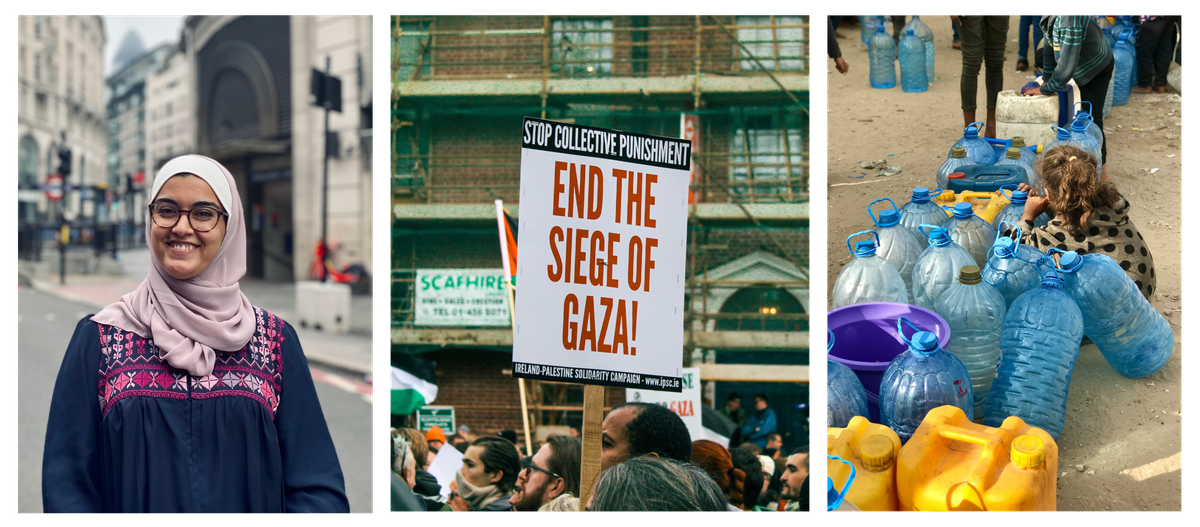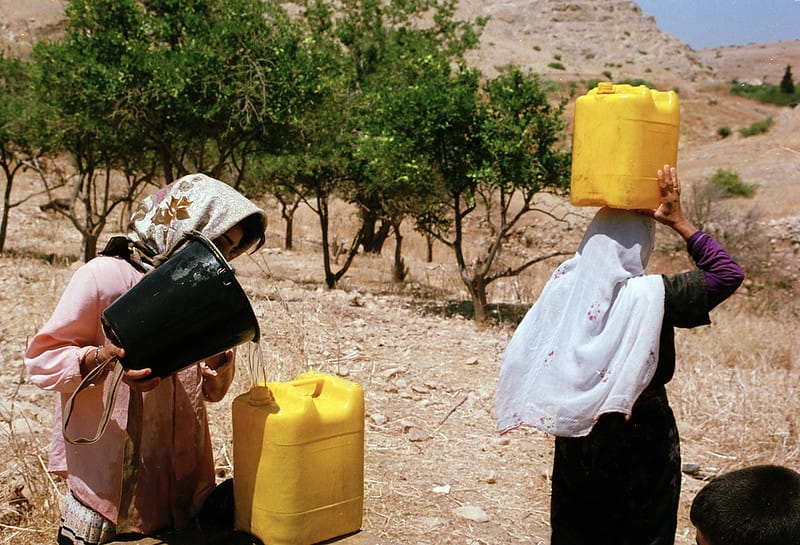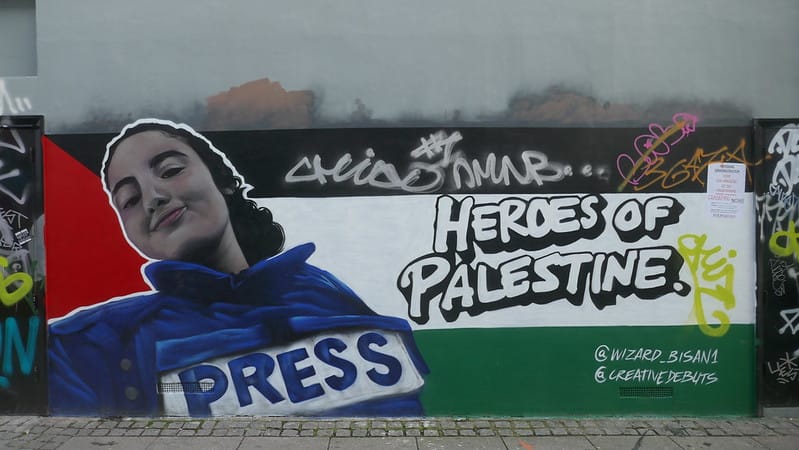Mariam Zaqout on Palestine’s Water Crisis
Gaza has been without operable water and sanitation infrastructure for almost two years. Efforts to rebuild must be Palestinian-led.

Paid subscribers make my reporting possible. Consider joining them:
As Israel’s assault on Gaza nears the two-year mark, the enclave’s population of about two million people is facing a devastating water crisis. Israeli bombardment and ground operations have damaged more than 80 percent of Gaza’s water infrastructure, leaving the average person in Gaza with access to only three liters of water each day. The World Health Organization estimates that individuals need 100 liters per day just to meet basic needs.
While the situation in Gaza is now catastrophic, Palestine’s water crisis long predates Israel’s October 2023 invasion. As I covered in previous reporting, a system of what some experts and rights groups call water apartheid has long prevailed, meaning that Israel, as an occupying power, manages water in a way that denies Palestinians fair access. Cutting off water to the enclave and destroying infrastructure are just the latest examples of its weaponization of the vital resource. Earlier interventions have even included rerouting the Jordan River, which flows southward along the Jordan-Palestine border from headwaters in Lebanon and Syria into the Dead Sea.
In this week’s newsletter, I speak to Mariam Zaqout, a water and economics researcher at University College London, about the politics of Palestine’s water crisis, why significant foreign investment has failed to solve the problem, and why any efforts to rebuild Gaza’s infrastructure must be Palestinian-led and informed by past failures.
Editor’s note: These responses have been condensed and edited for clarity.
Marianne Dhenin: For starters, what is the situation with water and sanitation infrastructure and humanitarian aid in Gaza now?
Mariam Zaqout: Sadly, because the war has been going on for so long, and there’s too little government presence, everything is chaotic. There’s duplication of efforts — some people get access to water two or three times a day, and then others don’t get access at all. Everyone is doing something, but not necessarily in an organized way. But you can’t blame them. The system is fragile. People, including aid workers, are struggling to survive, let alone operate a [humanitarian aid] system.
Now, even things like menstrual health management have become a big struggle. It was not an issue before because women and girls used to have their own time to talk about it. Mothers, aunties, and everyone in the community had the space to remember that a kid would need that type of support and awareness. But now women and girls are exhausted, and Gaza’s level of public health is sadly deteriorating, not because people don’t know, but because people are exhausted. [The lack of] supplies is another issue.
MD: What has been Israel’s role in manufacturing this crisis?
MZ: To start with, it’s not like Gaza was a desert. We had access to the valleys of the Jordan River before Israel drained them to divert water resources. The main reason that Gaza needs desalination plants is that Palestinians do not have access to their water rights. We cannot exercise our right to the Jordan River.
But that desalination infrastructure is very expensive, and in a tiny place like Gaza, with all the economic and movement restrictions, we are not even capable of maintaining it. Even without any restrictions, maintaining the desalination plants would be difficult. But, add that layer, and it becomes catastrophic because engineers and planners end up with big infrastructure that was built and paid for by big companies, international organizations, and foreign governments, and then those just fail.
MD: Tell me more about the restrictions that Israel places on supplies, including water and sewage pumps, through its list of so-called “dual-use” items. Israel bans these items because it claims they could be repurposed for military or “terrorist” objectives.
MZ: [The restrictions are] a systemic way of undermining Palestinian authority and autonomy over their services and ability to provide for their basic needs, such as water and sanitation. Particularly, the dual-use list that Israel publishes and organizations conform to is problematic. If you conform to whatever the occupier dictates to the occupied, you are conforming to their strategy to undermine Palestinians.
Not to mention, you can’t just label someone a terrorist. You are harming a whole community because of the word terrorist. You are suggesting that this community, this population of two million people, does not deserve the basic right to water and sanitation because some part of that community is willing to have armed resistance. [Water] is a basic human right, and to look for an excuse for why it should be restricted is horrible.
MD: Institutions like the World Bank and USAID have made significant investments in water and wastewater infrastructure in Gaza in recent years, but this hasn’t solved the enclave’s water shortage. In fact, Palestinian per capita water consumption was falling even before the invasion. Why haven’t these investments done enough to help?
MZ: International aid organizations have been working for decades, but they conform to the Israeli occupation’s narrative in all aspects. Because many of them are engineers and economists, they want to be practical. They just say, “Let’s not think about the political solution because that’s very complicated. Let’s just do the technical part.” After doing this for a long time, those aid agencies became frustrated with Gaza because, basically, they are pouring money into it for nothing. Some of this infrastructure costs more than 100 million Euros. But nothing is changing. Nothing is improving.
There’s a vicious cycle of failure in aid. Not just in Gaza, but aid in general has a problem of masking its failures because otherwise we would sound like we’re not doing our jobs well. But the way foreign aid is practiced does not help Gaza. It has made Gaza dependent. The utilities are forced to follow the lead of international aid. If an organization says, “Let’s do high-tech water treatment plants,” they do that. Even if some Palestinian engineers or consultants think that’s not sustainable, they still do it because it’s either you follow the funder or you don’t get the money. When you are vulnerable, you are forced to do things that you might not be convinced by or that you don’t think is the correct call, but you still do it because you are vulnerable.
MD: Still, aid organizations and foreign governments want to propose fantastical technological solutions for Gaza’s water crisis without addressing entrenched political issues or the real needs of the population. What are their motivations? What would real solutions look like?
MZ: For some countries, I would say it’s part of their wanting to be the good guy on an international platform. There are so many countries proposing solutions, like the United Arab Emirates wants to build big water plants in Sinai, Egypt, to deliver water to Gaza without the worry that Israel will destroy it or it will fail because of border closures. But this is not a solution; it would displace people to Sinai.
Looking for solutions that are not in line with the Palestinians’ will and autonomy to make decisions for themselves is very problematic. [These ideas] take every aspect of Palestinians’ right to water out of context and treat it like a quick fix, as if we don’t need to address the big issue, which is Israel’s violations of human rights and water treaties.
We can’t build from that place. We have to build by looking back decades at how this has been going on for so long, address the existential crisis between the Palestinians and Israelis, and then go from there.





